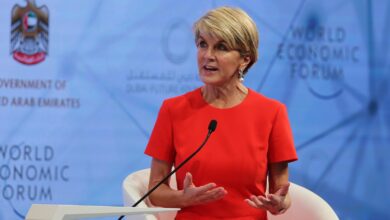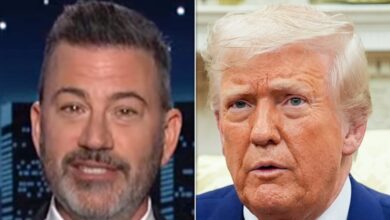What happened to former Chinese leader Hu Jintao?
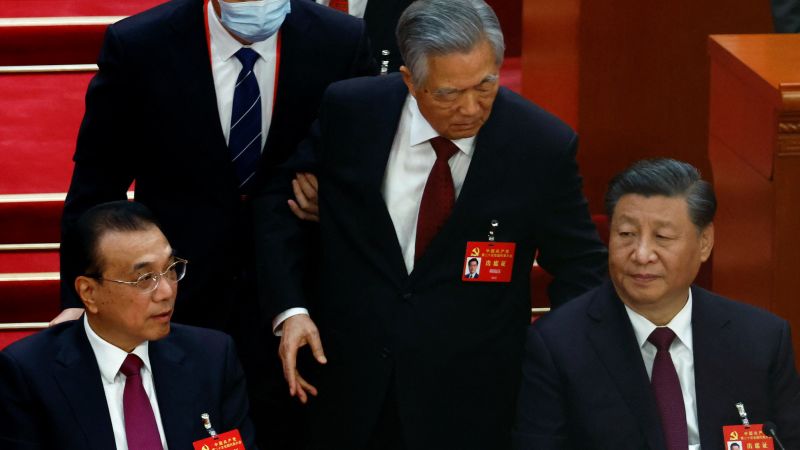
CNN
—
It is a moment that for many observers has come to define strongman leader Xi Jinping’s tightening grip on China: his visibly frail predecessor, Hu Jintao, being escorted out of a key Communist Party meeting during a five-yearly leadership reshuffle – apparently at Xi’s behest.
Images of two men ushering the 79-year-old from his seat and toward the exit were beamed across the world as the party’s National Congress came to a close Saturday, leading to days of speculation over whether Hu was the victim of a deliberately public power play.
This week, those rumors have only grown – despite a claim by Chinese state media on Twitter that Hu left due to ill-health – and the intrigue is likely to grow further still with the release of footage showing the 90 seconds leading up to his sudden removal.
The footage, released by Singapore broadcaster CNA on Tuesday, shows a series of high-level exchanges between senior party leaders, in which Hu is repeatedly prevented from looking at official documents in front of him.
It shows Li Zhanshu, the party’s outgoing number-three official, who is sitting next to Hu at the front table on stage, take the documents from Hu’s hand and place them under a red folder. When Hu then reaches for the documents, Li pulls them away.
Xi, who is sat on Hu’s other side, glances at the exchanges and summons a senior aide to whom he speaks briefly. Moments later, a second aide hurries over, receives an instruction from Xi, then speaks to an apparently nonplussed Hu.
As per the footage that circulated on Saturday, Hu – who appears reluctant to leave – is then lifted from his chair, taken by the arm and escorted out.

None of the footage – either that released on Saturday or Tuesday – has been broadcast in China. Neither has the incident been reported in Chinese language media, or discussed on Chinese social media, where conversations around senior leaders are highly restricted.
Late on Saturday night, China’s official Xinhua news agency tweeted in English that Hu “insisted on attending” the closing ceremony despite his poor health and was escorted out after feeling unwell. However, within China, where Twitter is blocked, the incident was not mentioned.
On Weibo, censors even restricted the search results for vague keywords such as “escorted away” or “leaving the meeting,” in an apparent effort to prevent users from making veiled references to the incident, according to Eric Liu, a censorship analyst with China Digital Times.
Tuesday’s footage has fueled fervent speculation about what was in the document and why Hu was not allowed to see it – and left observers divided over what sparked his exit.
Some maintain it was likely due to Hu’s poor health or mental state – after retiring in 2013, he has been seen in public looking increasingly frail. Others suggest it could be a deliberate power play by Xi to show his unrivaled authority.
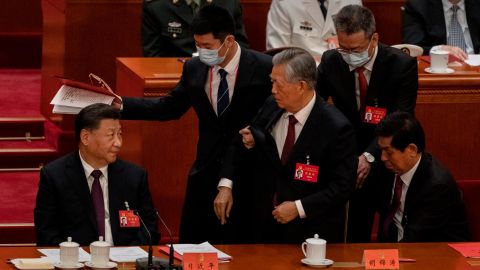
Like many unexplained episodes in the black box of elite Chinese politics, the true reason behind Hu’s unexpected departure may never be known. But experts say the symbolism – unintended or otherwise – is hard to miss: Having eradicated any vestige of influence from party elders or rival factions, Xi has ushered in a new era of one-man rule surrounded by only staunch loyalists.
Meanwhile, gone with Hu are the many hallmarks that had defined his decade in power during which he presided over a period of double-digit economic growth and comparative openness.
Hu also relinquished both his party and military posts when he retired in 2012 after two terms in power – earning him praise from Xi for “his broad mind and noble character.”

Xi’s broken almost all norms: CNN Beijing Bureau Chief reacts to China’s new leadership
While Hu was never as powerful as Xi is now – owing in part to the model of collective leadership and the balancing influence of multiple party factions and elders, including his predecessor Jiang Zemin – he was associated with a faction connected to the Communist Youth League, a once powerful grouping whose influence has diminished considerably during Xi’s rule.
Steve Tsang, director of the SOAS China Institute at the University of London, said the latest footage suggests Hu’s dramatic exit was likely not planned.
“For whatever reasons, Xi ordered Hu to be escorted out when he must have thought that Hu might not behave exactly as Xi would have wanted,” he said.
The new video has been interpreted by some as a sign of Hu’s supposed displeasure with the outcome of the Congress, which saw Xi consolidate his power by stacking the new leadership team with his loyal allies and proteges.
Premier Li Keqiang and Wang Yang, head of China’s top advisory body, both retired from the party’s supreme Politburo Standing Committee, despite being one year below the unofficial retirement age of 68. Both Li and Wang are seen as closer to Hu’s sphere of influence.
In an even more surprising revelation on Sunday, Vice Premier Hu Chunhua, another protege of the elder Hu (the two are not related), was dropped from the new 24-member Politburo. Once seen as a rising star being groomed for the top leadership, Hu Chunhua’s political future has dimmed under Xi.
But Wen-Ti Sung, a political scientist at the Australian National University, said a planned public purge at the closing of the congress was unlikely, given the party’s emphasis on unity.

China’s leader is set for a third term. One expert weighs in on what to expect
09:27
– Source:
CNN
“The Chinese Communist Party prizes the image of unity and control, and more so than ever during the Xi era,” said Sung.
If Xi had wanted to purge Hu to prevent the former leader from raising objections in public, he would have done so before foreign press were allowed into the auditorium, Sung said.
“A high-profile purge of Hu at a critical juncture like the 20th Party Congress shows the presence of dissent, and the notion that Xi is at least ‘challengeable,’” he said. “Neither is great for Xi’s image of invincibility.”
Many observers were also struck by the apparent coldness of the other leaders on the stage. Few showed any concern for Hu, and many avoided looking in his direction.
“There’s no empathy,” said Alfred Wu, an associate professor at the Lee Kuan Yew School of Public Policy at the National University of Singapore.
To rise through the party, officials have learned to hide their personal emotions and characteristics, Wu said, “They just try to be like a machine in the party machinery.”
On his way out, Hu patted the shoulder of his protege, Premier Li, who nodded and turned briefly to watch him walk away. Next to Li, Wang sat upright and stared straight ahead, seemingly frozen in motion.
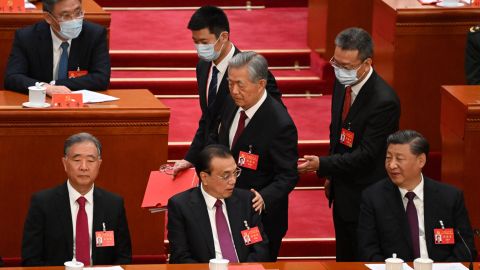
Further down the edge of the stage, Hu Chunhua did not even cast a glance toward the party elder as he passed by. Instead, he looked straight ahead with a notable frown and arms folded across his chest.
But even if the real reason for the elder Hu’s departure never becomes clear, the incident has nevertheless sent an unequivocal message about Xi’s absolute hold on power, analysts say.
Hu’s undignified exit showed that “Xi had reduced the once powerful (Communist) Youth League faction to insignificance,” said Tsang at the University of London.
“With no successor in sight, and the previous leader humiliated, Xi had projected to the party that…no one in the party should look over his shoulder for another leader, be him the future or the past leader,” Tsang said.
“Now there is only one leader in China.”
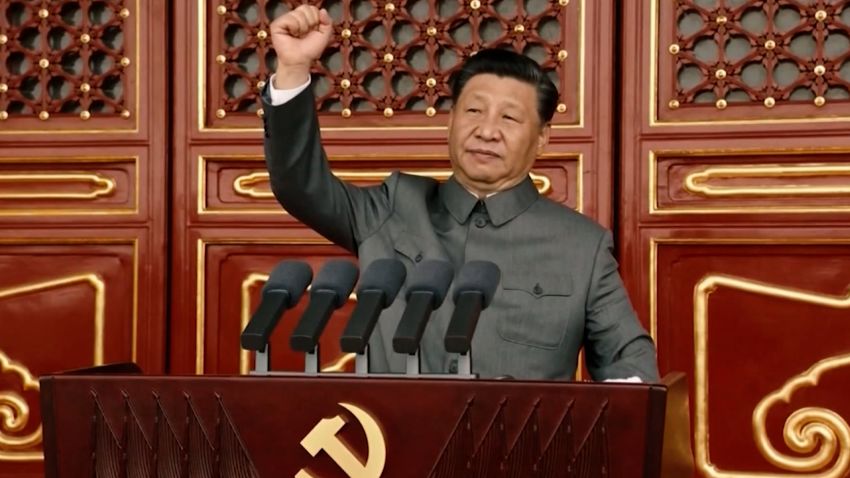
Here’s Xi Jinping’s vision to make China great again
Source link



